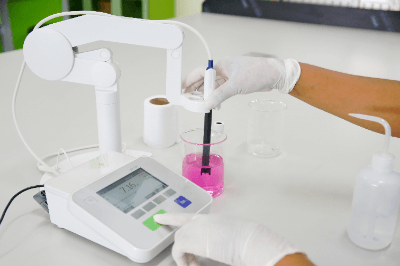What Is a pH Meter?

A pH meter is a precise instrument used to measure the pH, or hydrogen ion concentration, of a liquid, which is an essential indicator of water quality. These devices are vital in various fields, including environmental monitoring, food production, and medical research.
Uses of pH Meters
pH meters play a critical role in industries where water quality is paramount, such as waste management at incineration plants, boiler maintenance at thermal power plants, and wastewater management in construction. In the food industry, pH levels directly impact the taste and safety of products, necessitating accurate pH measurement.
Principle of pH Meters
The glass electrode method, commonly used in pH meters, involves measuring the potential difference between a glass electrode and a reference electrode. This potential difference, which changes with pH, allows for precise determination of a liquid’s pH level.
Electrode of pH Meters
Modern pH meters typically combine a glass electrode and a temperature sensor for accurate readings. The glass electrode, which has largely replaced platinum/hydrogen electrodes, contains an internal buffer solution sensitive to pH changes. This setup allows for a wide range of solution measurements.
Recent advancements have led to the development of composite electrodes, which integrate measuring and reference electrodes, simplifying the measurement process and enhancing the device’s versatility.
Measuring Soil With a pH Meter
Soil pH measurement is crucial in agriculture to ensure optimal growth conditions for various crops. However, measuring soil pH requires different techniques compared to liquid measurement. The MAFF provides guidelines for a simple indicator method, and portable pH meters are also available for direct soil testing.